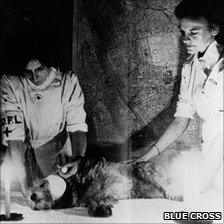Blue Cross charity marks animals' war contribution
- Published

Blue Cross vets assisted thousands of animals during the two world wars
The vital work carried out by animals during World War I and World II should never be forgotten, a charity has said.
The Blue Cross treated more than 300,000 animals, including horses and dogs, which assisted the troops in a variety of ways during the two wars.
Many carried soldiers on and off the battlefield and were used to pass on messages.
The charity urged people to use Armistice Day to honour the animals and soldiers who have died in war.
In a statement, Steve Goody from the charity, said: "The bravery and sacrifice of our troops will rightly never be forgotten, but neither should we overlook the vital role of the animals who made an important and selfless contribution to the war effort.
"The Blue Cross is deeply proud that the vital medical support we provided to ease the suffering of many thousands of animals in both world wars gave us our name today."
Thousands of war horses and dogs endured terrible conditions undertaking tasks such as carrying soldiers into battle, hauling ammunition and other essential supplies, and transporting vital messages between troops.
On Friday, staff at the charity's base in Victoria in London will mark the work carried out by their predecessors who tended animals made homeless in the Blitz 70 years ago.
They will attend a private remembrance service, organised by Voices for Horses, at the Animals in War Memorial in Park Lane in London.
In 1940 the staff cared for more than 150,000 dogs and cats, many of which were rescued from buildings that had been bombed.
Staff at 14 animal shelters across the capital treated the pets using candlelight or, for those whose injuries were too severe, put them humanely to sleep.
Other pets had been left behind as their owners were evacuated or called up to fight.
The charity is also taking part in the official Remembrance Sunday parade.
Originally founded as Our Dumb Friends League in 1897, the charity changed its name in 1958.
Its new name recognised the work carried out by its Blue Cross Fund which collected donations from members of the public to help war animals.
- Published11 November 2010